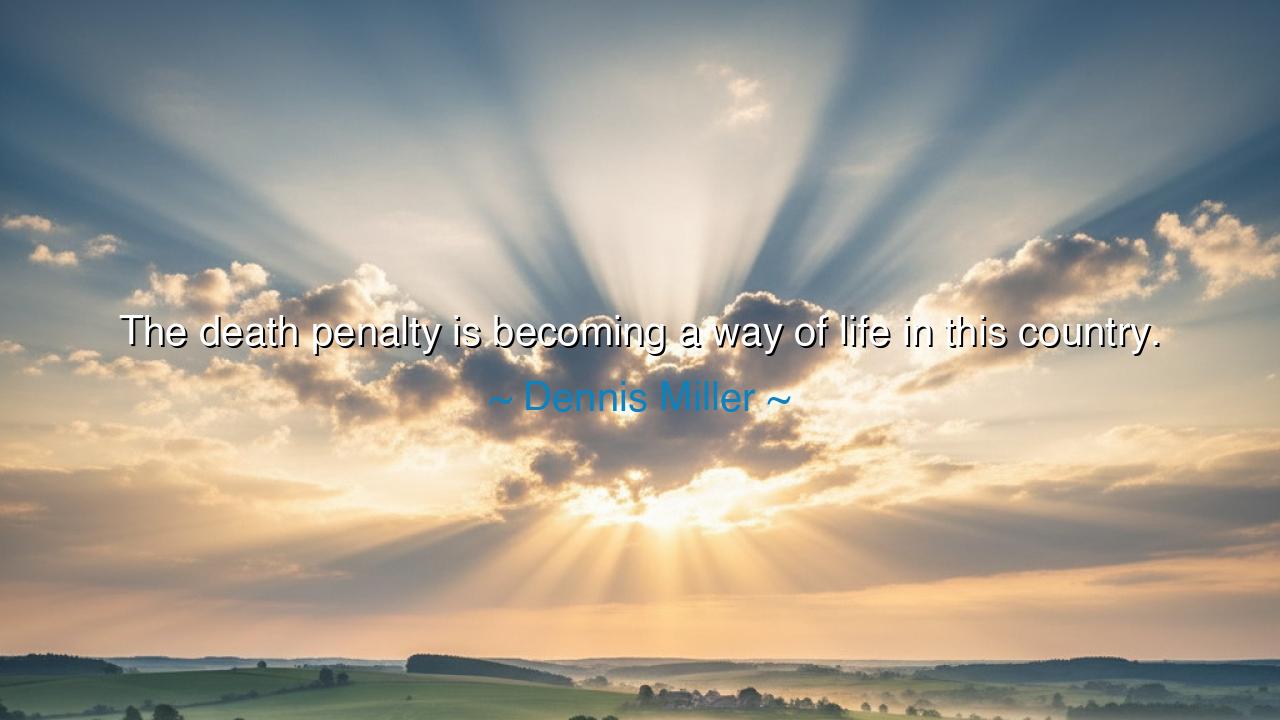
The death penalty is becoming a way of life in this country.






In the twilight of a troubled age, when justice itself seems to tremble beneath the weight of fear and vengeance, the voice of Dennis Miller rings out like a prophet in the wilderness: “The death penalty is becoming a way of life in this country.” These words are not merely a statement—they are a lament, a mirror held up to the soul of a nation that has begun to mistake retribution for righteousness. When the taking of life becomes as common as the drawing of breath, the people forget the sacredness of existence, and the fire of compassion flickers low in the heart of humankind.
In the beginning, punishment was meant to restore order—to remind men that actions bear consequence, and that law is the guardian of peace. Yet over time, when death itself becomes the instrument of justice, mercy is forgotten. A society that kills to prove that killing is wrong walks a path both dark and circular. It begins not with hatred, but with weariness—with the quiet surrender of empathy. Miller’s words warn us of this decay, this creeping numbness of the spirit, when the sight of another’s end no longer stirs sorrow but indifference.
Consider the story of Socrates, who drank the hemlock not for a crime of blood, but for questioning the customs of his city. The Athenian court, blinded by pride and fear, condemned wisdom itself to die. And when the cup touched his lips, Athens lost not just a man, but a part of its soul. The death penalty, in that ancient hour, became not a tool of justice but of insecurity—a way to silence dissent and preserve comfort. So too in our modern times, when execution becomes habitual, we risk killing not only the guilty, but the very conscience that separates civilization from barbarity.
To take a life, even under the name of law, is to bear a burden that stains the spirit. No nation can wield the sword of death too long without dulling its heart. The ancients knew this: the Romans, mighty though they were, spoke of clemency as the mark of true power. The emperor who spared when he could destroy was seen as godlike, for mercy, not wrath, was the virtue of the strong. When Miller speaks of the death penalty becoming a way of life, he speaks of a society that has forgotten this truth—one that wields the sword not as a last resort, but as a habit of mind.
Yet the quote is not merely condemnation; it is a call to awakening. It reminds us that justice without compassion is a hollow shell. To live rightly, a people must hold both law and mercy in balance, for justice must never forget humanity. The moment punishment becomes routine, it ceases to be moral—it becomes mechanical. It is then that the death penalty, born of rare necessity, grows into a daily ritual, an echo of our own unresolved rage.
Learn from the past, O reader. Recall the stories of those who were once condemned but later found innocent—those whom the state would have silenced forever had fate not intervened. Each such tale is a warning written in blood: that no man, no court, no government is infallible. The power to take life must be wielded with trembling hands, if at all. For in the taking of one, we risk the loss of all.
And so, let this teaching be passed to future generations: to value life above vengeance, to question the comfort of easy justice, and to build systems that heal rather than destroy. When anger rises, let reason and empathy be its temper. When wrong is done, seek restoration, not annihilation. Only in this way can a society preserve its soul.
For if the death penalty becomes a way of life, then death itself becomes the teacher of our age—and from such a teacher, we shall learn only sorrow. But if mercy becomes our guide, then life, with all its frailty and forgiveness, will remain our most sacred law.






AAdministratorAdministrator
Welcome, honored guests. Please leave a comment, we will respond soon